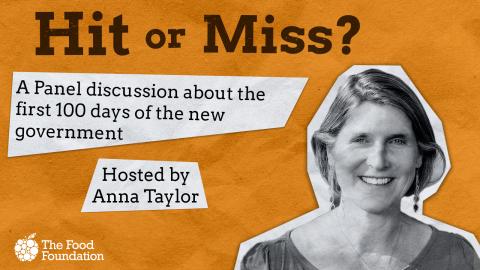12 December 2024
Does Labour's food strategy mean the food system is finally being prioritised?

Following the government's announcement of a new food strategy our Public Affairs Lead Joss MacDonald analyses whether it can deliver for the health of the nation and the planet
For too long, successive Governments have failed to see food as a distinct political subject. It is significantly more than a subsection of farming, health or economic policy.
That is why the announcement by Steve Reed MP, the Secretary of State for Environment, Food and Rural Affairs on Tuesday, about proposals for a new food strategy, has been so roundly welcomed by stakeholders across the sector.
The proposal for a strategy picks up where the last government left off, after they abandoned their own attempts to look at the food system in the round.

It is a crucial initiative, and a genuine opportunity to break from the status quo of an underregulated and under supported food system that is clearly failing to deliver for both the health of the nation and the health of the planet.
The strategy will be led by the Department for Environment, Food and Rural Affairs (DEFRA), but will also bring in the Department for Health and Social Care (DHSC) and the Department for Education (DfE).
This recognition that our food system needs to be looked at holistically is key to genuine change and improvement.
If we get our food system right, it can boost health and wellbeing, employment, education, the environment, the economy, help address inequalities, and maybe most importantly: our enjoyment of food.
The need for a new approach from the top is starkly highlighted by today’s publication of Government’s Food Security Report, which is released once every three years.
It shows that household food insecurity has risen, due to steep inflation across the economy with wages and salaries not keeping up with rising prices. This reflects the worrying trend of The Food Foundation’s own food insecurity surveys which are also quoted in the report.
Food inflation has been markedly high, however, reaching a 45-year peak in 2023 – the highest food price inflation in the G7. This too has been borne out the Food Foundation’s basic basket tracker research.
Poor affordability of food is not just affecting people’s ability to eat, but also to eat a healthy and nutritious diet. To quote the report directly: “Consumers have responded [to inflation] by buying cheaper goods and prioritising price over other factors (such as environment, health, and wider ethical values).
"Market and supply volatility has therefore weakened access to food and also agency by weakening choice. (emphasis in original).
The report shows that the poorest 10% of the country eat an average of 42% less fruit and vegetables than is recommended, while the richest eat 13% less.
Improving the availability of fruit and vegetables to those on the lowest incomes must therefore be a key task of the Government’s food strategy. Unequal access to food is a major driver of health inequalities in the UK, and is key for the Labour Government to tackle if they are to meet their manifesto commitment to halve the difference in healthy life expectancy between the richest and poorest areas of the country.
The Food Security Report shows that it is not purely economic variables that lead to differences in access to food: if you are a person of colour, disabled or have children, you are notably more likely to be experiencing food insecurity, and not able to access the healthy diet which you need to live well.
This is made worse by the clear inadequacy of the nutritional safety net as it stands. Universal primary free school meals currently exist in London and Wales, but the low levels of provision across the rest of the country in primary schools as well as secondary schools everywhere, is leaving many children without a hot nutritious meal that they need to learn, grow and flourish.
Despite increasing food insecurity levels, there is also a worrying decline in the number of people receiving Healthy Start in all regions of England (except for London) as well as in Wales and Northern Ireland (Scotland is served by a similar but higher value scheme – Best Start).
The parlous state of both the Free School Meal and Healthy Start schemes paint a picture of a social security system that is failing in one of its key tasks: ensuring that all children in our society are adequately fed.
Labour was elected on a manifesto which pledged to end mass dependency on emergency food parcels, and raise the healthiest generation of children ever.
They are both significant pledges, which require bold action, taking us away from a status quo that is clearly failing to deliver for both the population’s nutrition and resultant health outcomes, and for our planet and nature.
The last Food Security Report, published in 2021 highlighted that climate change and damage to the environment and natural world posed the biggest threat to our food security.
This year’s report shows global heating has already begun to significantly affect our food system and as a result, the lives of people in the UK.
It will come as little surprise to UK growers and horticultural farmers that there was a 13% reduction in domestic vegetable production between 2021 and 2023, while fruit production dropped by 12% between 2022 and 2023.
Both of these drops were caused by increasingly wet Springs and highlight the need for horticulture to play a significant part in a food strategy to support British farmers and increase both production and consumption of locally grown fruit, vegetables and pulses.
Steve Reed’s own comments to stakeholders yesterday, were incredibly welcome when he spoke about the need for the Government’s food strategy to guarantee access to affordable, healthy and nutritious food for everybody.
We all share his stated anger about the fact that so many people, including children, are going without food in one of the richest countries on the planet.
So, while the Food Security Report does not and cannot paint an optimistic picture of where we are, we, at the very least, do now have an opportunity to bring about change.
The Food Foundation will be doing everything it can to work with Government to make that change happen.





